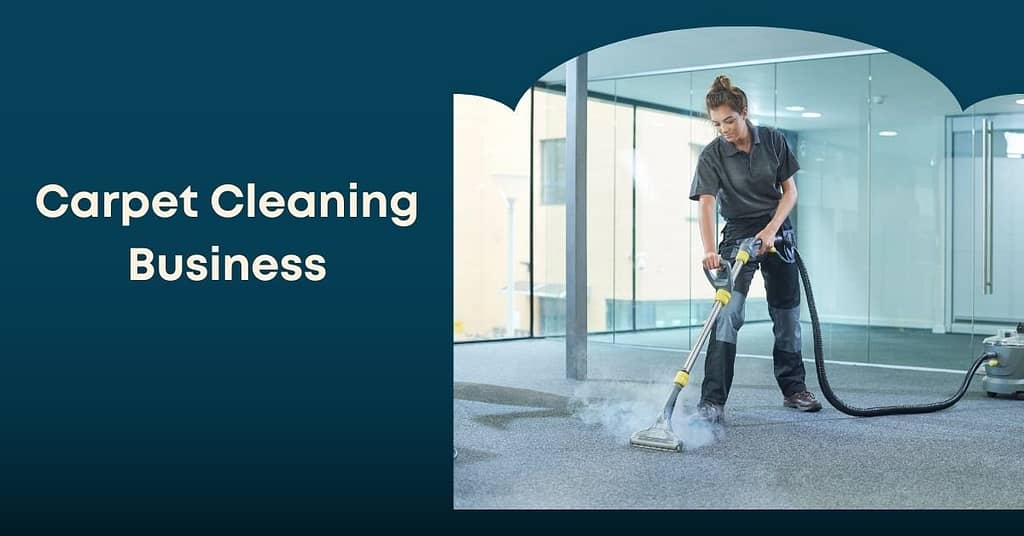Carpet cleaning is a crucial service for maintaining the hygiene and appearance of residential and commercial spaces. Over time, carpets accumulate dirt, allergens, and stains, making professional cleaning services necessary. As more people and businesses recognize the need for clean carpets, carpet cleaning services are becoming increasingly popular. But is carpet cleaning a profitable business?
In this comprehensive guide, we will explore the ins and outs of the carpet cleaning industry. We’ll examine the potential profitability of starting a carpet cleaning business, the associated costs, the market demand, and tips for ensuring success. If you’re considering entering the industry or just curious about its potential, this article will provide valuable insights.
Table of Contents
The Carpet Cleaning Industry Overview
The carpet cleaning industry is part of the broader cleaning and janitorial services sector, which encompasses a wide range of services from residential cleaning to specialized commercial cleaning. The demand for carpet cleaning is driven by various factors:
- Allergy and Health Awareness: With growing awareness of health issues related to allergens and dust, people are paying more attention to maintaining clean carpets in their homes and businesses.
- Property Maintenance: Carpets are a significant investment for both homes and commercial spaces. Regular cleaning helps extend the lifespan of carpets, which appeals to property owners who want to protect their investment.
- Commercial Properties: Businesses and offices often have large areas of carpet that require regular cleaning to maintain a professional appearance.
The demand for professional carpet cleaning is steady, and in many regions, it’s growing. This consistent demand makes carpet cleaning a potentially profitable business if approached with the right strategy.
Is Carpet Cleaning a Profitable Business?
Yes, carpet cleaning can be a profitable business, but like any business, its success depends on several factors. Let’s explore the factors that contribute to the profitability of a carpet cleaning business:
- Low Startup Costs: Compared to many other service-based businesses, carpet cleaning has relatively low startup costs. The primary investment is in equipment such as carpet cleaning machines, vacuum cleaners, and cleaning products. In some cases, a van for transportation may also be necessary. This lower initial investment makes it an attractive option for entrepreneurs with limited capital.
- High Demand: As mentioned earlier, there is a consistent demand for carpet cleaning services. Residential homes, commercial offices, hotels, and apartment complexes all require regular carpet cleaning. This broad market base ensures that carpet cleaning businesses have a wide range of potential clients.
- Recurring Business: Carpet cleaning is not a one-time service. Carpets need to be cleaned regularly to maintain their appearance and hygiene. This means that satisfied customers are likely to become repeat customers, providing your business with a steady stream of income.
- Scalability: Carpet cleaning businesses can start small, serving local residential customers, and then expand to commercial contracts or multiple service areas. As your business grows, you can hire more employees, invest in better equipment, and expand your service offerings.
While carpet cleaning is generally a profitable business, achieving success requires careful planning and execution. Understanding the costs, pricing strategies, and customer needs is essential for long-term profitability.
Costs Associated with Starting a Carpet Cleaning Business
Like any business, carpet cleaning comes with its share of startup and operational costs. Here’s a breakdown of the common expenses:
- Initial Equipment: The main equipment you’ll need includes a professional carpet cleaning machine, industrial vacuums, and a variety of cleaning solutions. The price of carpet cleaning machines can range from $1,000 to $10,000 depending on the brand and capabilities.
- Vehicle: If you’re planning on operating a mobile service, you’ll need a reliable vehicle to transport your equipment. A van is usually the most practical choice, and a decent used van can cost anywhere from $10,000 to $25,000.
- Supplies: Cleaning solutions, brushes, and detergents are necessary for day-to-day operations. While these are recurring costs, they are generally manageable and scalable based on the number of jobs you take.
- Marketing and Advertising: To build a client base, you’ll need to invest in advertising, whether it’s digital marketing, print ads, or networking events. Initial marketing costs can range from $500 to $5,000 depending on the scale.
- Business Licensing and Insurance: It’s important to have the proper licenses and insurance before starting a carpet cleaning business. Depending on your location, a business license might cost $50 to $500. Liability insurance, which protects your business in case of accidents or damages, can cost around $500 to $2,000 annually.
- Labor Costs: If you’re running a solo operation, you can eliminate labor costs in the early stages. However, as your business grows, you’ll likely need to hire employees. Pay rates for carpet cleaning technicians vary by location, but you can expect to pay an hourly wage of $12 to $20.

Revenue Potential for a Carpet Cleaning Business
The profitability of a carpet cleaning business depends on your ability to attract customers and price your services effectively. Below are some key revenue considerations:
- Pricing Structure: Most carpet cleaning businesses charge by the square foot or by the room. Typical rates range from $0.15 to $0.30 per square foot, depending on the complexity of the job, the region, and the type of carpet. For example, cleaning a 1,000-square-foot home could generate revenue between $150 and $300.
- Commercial vs. Residential Clients: Commercial clients generally offer larger, more consistent contracts than residential clients. However, the competition for commercial contracts can be stiff, and the pricing is often more competitive. On the other hand, residential clients may have smaller jobs, but they offer the opportunity for higher margins and repeat business.
- Additional Services: Many carpet cleaning businesses offer additional services such as upholstery cleaning, stain removal, and water damage restoration. These services can increase your revenue and make your business more profitable.
Marketing Strategies for Carpet Cleaning Businesses
One of the most critical aspects of running a successful carpet cleaning business is attracting and retaining customers. Here are a few marketing strategies to help you grow your client base:
- Local SEO: Ensure that your business is listed on Google My Business and other local directories. Optimize your website for local search terms like “carpet cleaning services near me” or “best carpet cleaners in [City Name].”
- Social Media Marketing: Use platforms like Facebook, Instagram, and LinkedIn to promote your services. You can run targeted ads or share before-and-after photos of your cleaning jobs to showcase your expertise.
- Referral Programs: Offer discounts or rewards to customers who refer friends or family to your business. Word-of-mouth marketing is one of the most effective ways to build trust and acquire new clients.
- Partnerships: Partner with local real estate agents, property managers, and businesses to offer your services. These partnerships can help you secure larger commercial contracts and repeat business.
Challenges in the Carpet Cleaning Business
While carpet cleaning can be a profitable business, it’s not without challenges. Here are a few hurdles you might encounter:
- Competition: In most areas, there are several carpet cleaning businesses competing for the same customers. To stand out, you’ll need to offer exceptional service, competitive pricing, and innovative marketing strategies.
- Seasonality: Carpet cleaning demand can be seasonal, with busier times during spring and fall. You’ll need to plan your finances and marketing efforts to manage slower periods.
- Labor Intensive: Carpet cleaning is physically demanding work. You’ll need to be in good physical shape or hire employees who can handle the strain of lifting equipment and cleaning carpets all day.
- Client Expectations: Meeting client expectations can be challenging, especially when dealing with tough stains or high-traffic areas. Having the right equipment and training is essential for delivering top-quality service.
Tips for Success in the Carpet Cleaning Industry
Here are some key tips for making your carpet cleaning business successful:
- Invest in High-Quality Equipment: Using the best tools and cleaning solutions will help you deliver superior results, which can lead to repeat business and referrals.
- Offer Exceptional Customer Service: Building a loyal customer base requires excellent customer service. Always be polite, punctual, and professional, and go the extra mile to satisfy your clients.
- Upsell Additional Services: Once you’ve established trust with your customers, offer additional services like upholstery cleaning, area rug cleaning, or even tile and grout cleaning. This can help increase your average job size and overall revenue.
- Build an Online Presence: A professional website, positive reviews, and active social media profiles are essential for building trust and attracting new customers.
- Create a Recurring Service Plan: Offer customers discounted rates for signing up for regular cleanings. This helps ensure a steady stream of income and encourages repeat business.
Can You Make Money as a Carpet Cleaner?
Yes, you can make a good income as a carpet cleaner. With consistent demand from residential and commercial clients, professional carpet cleaners can build a profitable business. By offering excellent service, competitive pricing, and additional services like stain removal or upholstery cleaning, carpet cleaners can generate steady revenue and attract repeat customers.
What Is the Profit Margin for a Carpet Cleaning Business?
The profit margin for a carpet cleaning business typically ranges between 20% and 45%, depending on factors like pricing, location, and efficiency. Since overhead costs are relatively low after the initial investment in equipment, many carpet cleaning businesses achieve healthy profit margins by controlling operational expenses and securing regular clients.
How Big Is the Carpet Cleaning Industry?
The carpet cleaning industry is a multi-billion dollar market globally, with the U.S. industry alone valued at over $5 billion annually. This large market includes both residential and commercial clients, making it a stable and growing sector within the cleaning industry. The demand for professional carpet cleaning services continues to rise due to health, hygiene, and aesthetic concerns.
How Much Does It Cost to Start a Carpet Cleaning Business?
Starting a carpet cleaning business can cost anywhere from $5,000 to $20,000, depending on the scale of your operation. Initial expenses typically include equipment like carpet cleaning machines, cleaning supplies, a vehicle for transportation, insurance, and marketing. These startup costs are relatively low compared to other service-based businesses, making it an accessible option for entrepreneurs.
How to Start a Carpet Cleaning Business with No Money
Starting a carpet cleaning business with no money requires creativity and resourcefulness. You can begin by renting equipment instead of purchasing it, working with a partner, or offering services as a subcontractor for an established company. Additionally, using free marketing channels like social media and building a reputation through word-of-mouth can help you acquire your first clients without a large upfront investment.
Conclusion
So, is carpet cleaning a profitable business? The answer is a resounding yes, but it depends on how you manage and grow your business. With low startup costs, high demand, and the potential for recurring business, carpet cleaning offers plenty of opportunities for entrepreneurs. By investing in quality equipment, providing excellent customer service, and implementing effective marketing strategies, you can build a successful and profitable carpet cleaning business.

